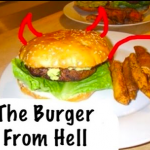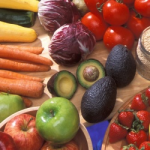“An extra burger meal a day eats the brain away," is the sort of arresting headline you’d expect from a tabloid. But it actually comes directly from a recent university press release, relating to a review of the evidence around diet and dementia published in Frontiers in Neuroendocrinology. Nutritionist Angela Dowden assures us that a burger will not eat your brain.
Food & Nutrition
Can a Livestock Revolution -- like Norman Borlaug's Green Revolution -- bring technological improvements to increase meat production in an environmentally responsible way? The Breakthrough Institute's whitepaper votes in the affirmative.
The truth is that sugar is just sugar. Neither good nor bad, but simply another dietary component that can be consumed in moderation without guilt or worry.
We use all our senses while eating. We notice the taste, the crunchy feel, the snap, and the crackle and pop. As it turns out, whether we stand or sit may affect our perception of foods taste and are subsequent consumption.
This concoction is a brew made by smooshing fresh coffee in a blender with grass-fed, unsalted butter and oil. It was invented by Silicon Valley entrepreneur Dave Asprey, who created the recipe after feeling energized from drinking tea with yak butter (seriously) while meditating in Nepal. Is Bulletproof just a bunch of bull? Angela Dowden, an award-winning nutrition and health writer, isn't terribly impressed.
The Lancet has gone on an ideological bender against alcohol consumption and refuses to publish data that challenges their shaky assertions.
A small, but intriguing study suggests that ultra-processed designer foods are both calorie dense and eaten more quickly. That's a perfect combination for gaining weight.
Michelle Obama’s memoir, Becoming, sold 10 million copies in just six months. Random House Chief Executive said, “It could be the biggest selling autobiography ever.” In addition to people buying her book, they are shelling out big bucks to see her speak about it. If Let’s Move Childcare had that success rate, childhood obesity would be eradicated like the bubonic plague. But that didn't happen. Here's why.
Everyone is perpetually confused about how often nutrition experts change their minds about the health impact of consuming eggs. In the past several weeks alone, two powerful studies -- of course, contradicting each other -- were published in major medical journals. One states that eggs will prevent heart attacks; the other that they will lead to heart attacks and death. What's the real message? ACSH advisor Dr. David Seres explains.
Certain foods, due to their effect on blood sugar levels, precipitate the release of molecules which are associated with inflammation. Excessive consumption of refined carbohydrates, french fries or soda isn't going to trigger that response. While those who eat this way may have significant negative health issues, it won't be due to so-called “inflammatory” foods. To suggest so is junk-science and a lack of common sense.
Are Giant pandas closer to bears or raccoons? It turns out that based on their eating habits, they share qualities of both. Perhaps pandas are not the vegetarians they seem to be.
A group of researchers studying drinks seeks a genetic source of our taste. And one important questions emerges: Are some people genetically wired to drink bitter or sweet beverages more often?











